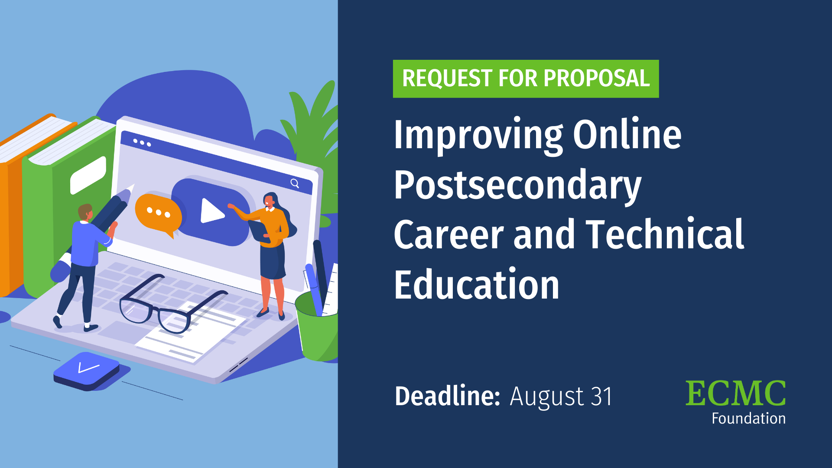Improving Online Postsecondary Career and Technical Education: Why We’re Making a Significant Investment
August 24, 2020
by Jennifer Zeisler, Senior Program Director, Career Readiness
With the fall semester upon us, administrators at postsecondary institutions are grappling with the decision to return to campus or continue online learning. While it might be too soon to know how the COVID-19 pandemic will ultimately affect postsecondary education, the current focus on keeping students, faculty, and staff healthy has forced academic leaders to make difficult decisions that could have lasting consequences. As a foundation focused on improving postsecondary outcomes for individuals from underserved backgrounds, ECMC Foundation has explored different strategies for how best to allocate resources and respond to the needs of postsecondary institutions during this challenging time. We feel a sense of urgency to focus on near-term impact, while also committing to efforts that can lead to long-term equity reforms.
As campus leaders navigate the pandemic-induced challenges, the staggering unemployment rate and economic downturn are likely to increase demand for postsecondary education. Based on enrollment trends documented during the previous recession, many Americans will turn to postsecondary education as a way to obtain the skills necessary to get back to work. Yet community and technical colleges – the very institutions positioned to provide needed education and training – have mostly moved online, a move that, according to an Inside Higher Ed survey of college presidents, is likely here to stay.
While the move online has enabled postsecondary institutions to continue core programming and reach students hoping to learn new skills and acquire credentials, concerns remain over historically low success rates for students enrolled in online-only education programs. These achievement gaps are even greater for the 69% of undergraduate students—41% of which identify as African American or Latinx—currently enrolled in career and technical education (CTE) programs at a community or technical colleges.
The pandemic coupled with our country’s long overdue reckoning on racial inequality has underscored the urgency for ensuring the implementation and expansion of online postsecondary CTE is done with equity in mind. Since launching the portfolio in 2015, the Career Readiness team at ECMC Foundation has recognized virtual learning as a key strategy for postsecondary institutions and has supported research, technical assistance, and the implementation of innovative approaches in an effort to improve online postsecondary CTE. We have identified promising practices as a result of these grant-funded efforts, but believe there is still significant work to be done to ensure online CTE programs incorporate learner-centered approaches, offer wraparound supports, and integrate industry-informed pathways before widescale adoption can happen.
In an effort to build upon previous investments, ECMC Foundation is making a significant commitment to support online postsecondary CTE, dedicating up to $2.5 million to improve student outcomes and close equity gaps. We launched a competitive RFP process earlier this month to identify one organization positioned to mobilize a coalition and transform the way CTE faculty teach and students learn. We hope this effort will work towards reducing completion gaps in online postsecondary CTE programs, especially for African American and Latinx students, and seed the innovative change that CTE needs to meet this moment and thrive in the future.

The ECMC Foundation Career Readiness portfolio makes grants to improve postsecondary career and technical education outcomes for individuals from underserved backgrounds. The portfolio’s theory of change centers on the evidence that learners who complete credit-bearing programs and earn academic credentials will experience increased social mobility. Please click here to learn more about the recently released RPF, review the proposal guidelines and application process, read answers to frequently asked questions, and learn more about the opportunity, timeline, and selection criteria. All proposals must be submitted via ECMC Foundation’s online form no later than 3:00 PM (PT) on August 31, 2020.
